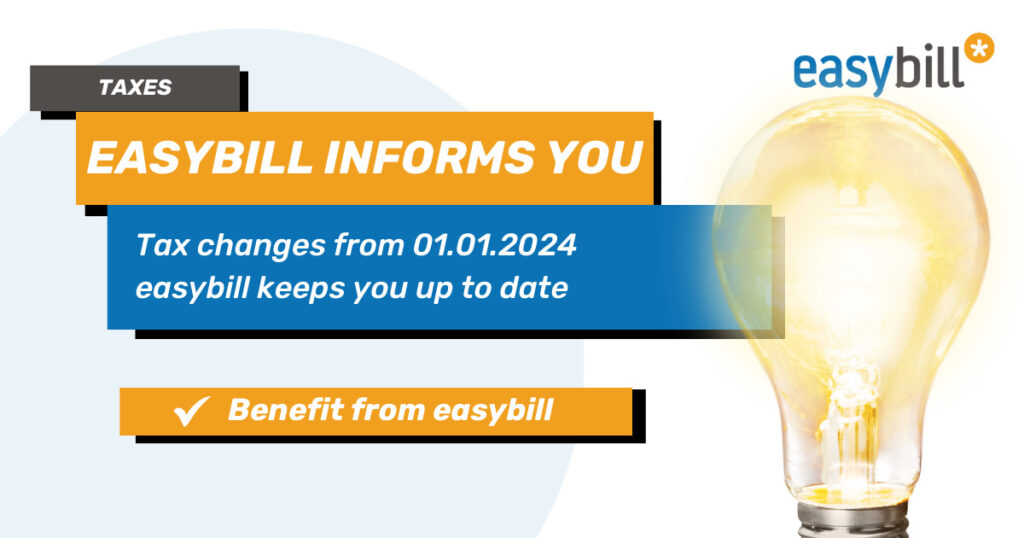
To ensure that you are as well prepared as ever for the coming year 2024, we have summarized the most important tax changes for entrepreneurs. There are also a number of other changes that will primarily affect private households and are therefore covered in less detail here.
However, the most important thing for you in advance: easybill will continue to support you in 2024 and will certainly continue to make your everyday business life easier with many new features.
Table of content
- Everyone is talking about the Growth Opportunities Act
- Increase in the tax-free allowance for employee benefits in the context of company events
- Increase for meal allowances
- Adjustment limit for low-value assets
- Tax adjustments for e-commerce
- Tax reduction in the gastronomy sector
- Innovations for the accounting obligation
- Outlook for the e-invoice
Everyone is talking about the Growth Opportunities Act
So far, it is still a draft by the German government, but some of the following contents are already known. The law itself may still be approved by decision in December. Especially with regard to the development of e-invoicing in the B2B sector, there are some interesting innovations that we would like to present to you.
Increase in the tax-free allowance for employee benefits in the context of company events
Previously, there was an approved, tax-free amount of 110 euros for employees. As of 01.01.2024, this amount will now be raised to 150 euros. If you are now planning your company celebrations for 2024, pay particular attention to the requirements for when a celebration can actually be declared as a company celebration and when it cannot.
However, it will certainly go down well with your salaried employees, their companions or employees on temporary contracts as well as temporary workers if company events can continue to take place because the financing is made a little more attractive for entrepreneurs.
Increase for meal allowances
Previously, a per diem meal allowance of 28 euros could be claimed for absence from the employee’s home or first place of work. Here, too, there is an adjustment in favor of employees. The amount is to be increased to 30 euros from the beginning of 2024.
Adjustment limit for low-value assets
Of course, entrepreneurs should not miss out on the Growth Opportunities Act either. Many adjustments have a major impact on the German economy and companies based in Germany. This includes the adjustment of the limit for GWGs. Previously, a limit of 800 euros applied to purchased assets. In order to make future purchases even more attractive for companies, the limit will be raised to EUR 1,000.
Then there are the various options for depreciating these assets. Check directly whether it would be worthwhile for you and your company.
Tax adjustments for e-commerce
As some EU countries are also making tax adjustments as of 01.01.2024, you will be particularly affected if you are active in e-commerce. In the age of OSS and international sales, it can therefore be assumed that almost all online retailers will be affected by the following tax rate changes:
- Austria (AT): A so-called zero tax rate will be introduced to promote photovoltaic systems.
- Malta (MT): A completely new reduced VAT rate of 12% will be introduced for certain services. Check here whether you are affected.
- Czech Republic (CZ): A new reduced VAT rate of 12% will be introduced. However, this means that the reduced and super-reduced tax rates of 15% and 10% no longer apply. A zero tax rate will also be introduced here. Here too, you should check whether your items are affected.
- Luxembourg (LU): The temporary tax reduction ends on 31.12.2023 and Luxembourg will return to the previous tax rates from 01.01.2024 (standard tax rate 17%, reduced tax rates of 3% and 8%).
- Estonia (EE): The current standard tax rate will be increased from 20% to 22%.
Tax reduction in the gastronomy sector
Until now, a reduced tax rate in the catering sector was in place for a limited period until the end of 2023 in order to provide economic support to many businesses after the coronavirus crisis. This reduction will now be discontinued from 01.01.2024. The catering industry will return to the regular tax rate of 19% if the food is consumed on site. If it’s ordered to take away, 7% will continue to be applied.
Innovations for the accounting obligation
There will also be an innovation in the area of bookkeeping, or the obligation to keep accounts, in the coming year. The current regulation stipulates that if total turnover exceeds 600,000 euros or a profit of 60,000 euros or more, there is an obligation to keep accounts. This threshold will now be raised to 800,000 euros and 80,000 euros profit respectively. The aim is to minimize the bureaucratic burden and also the cost factor of tax consultants and the like can be further reduced. This can result in considerable savings for small and medium-sized companies.
If you then also rely on modern software for accounting or pure invoicing, that’s half the battle. easybill supports you in the management of invoices, quotations, delivery bills and much more. Evaluations and exports, especially the DATEV export, make your day-to-day work easier and allow you to quickly transfer all relevant tax data to your tax consultant.
Outlook for the e-invoice
Although no new developments in the area of e-invoicing are planned for 2024, you should use the coming year to prepare yourself and your company sufficiently. E-invoicing will start in 2025, albeit in several stages. The plan so far is that companies will only have to be able to receive e-invoices in 2025. Only from 2026 or 2027 will there be further requirements for the creation of e-invoices. easybill will of course keep you up to date, especially if new findings emerge in the meantime.
Electronic invoices in ZUGFeRD and XRechnung format can already be created in easybill. Orders to public institutions and authorities already require an e-invoice. In easybill, you create a regular invoice as usual and let the software generate the electronic format. Sounds too simple to your ears? It actually is! See for yourself and take a look at the easybill account.
Read also:
Put an end to confusion: we explain technical terms in easybill
E-Invoicing obligation for craftsmen: The most important facts about the changeover as of 2025
Change from small business to standard taxation (german help center)


